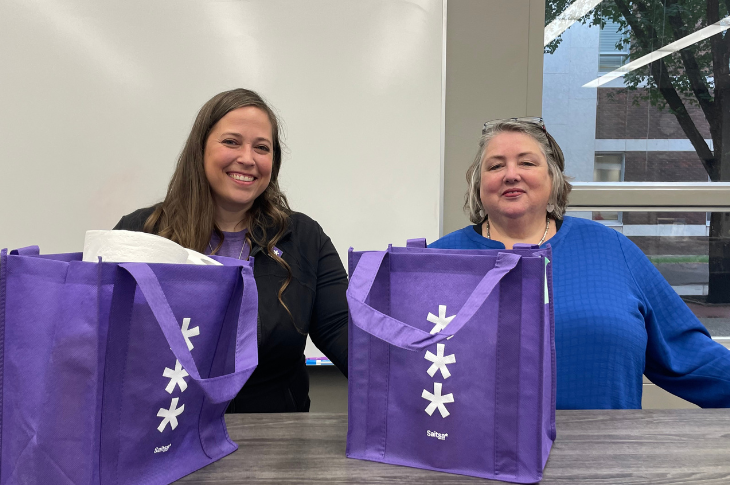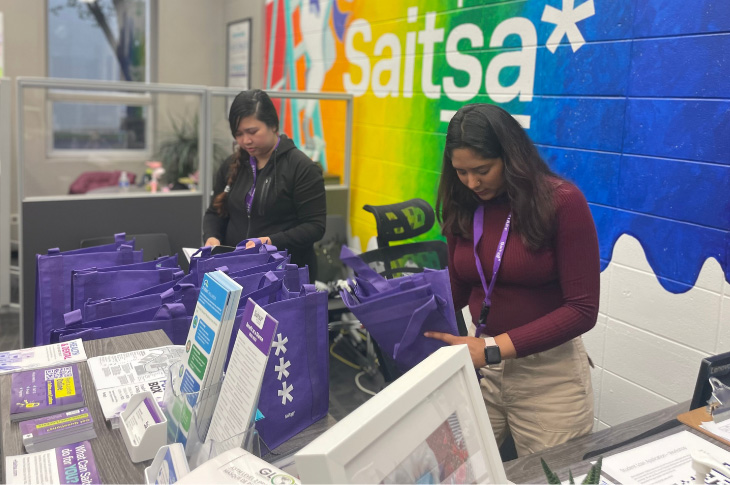Campus collaboration addresses student food security

Ask Rachel Paris about food insecurity, and she’ll explain it’s more complex and widespread than most people realize.
“Our research suggests more than 50 percent of Canadian post-secondary students aren’t sure where their next meal will come from,” says Paris, Manager of Governance and Advocacy with the Southern Alberta Institute of Technology Students’ Association (Saitsa).
She quotes a 2021 study by Dieticians of Canada that found food insecurity causes mental health issues, including anxiety and depression.
“Students trying to launch their careers while also contending with issues around food security are deeply disadvantaged,” Paris says.
That’s why Saitsa is partnering with SAIT and the Ptarmigan Charitable Foundation on a pilot project to strengthen food security for SAIT students.
The partnership, accelerated by the Foundation’s generous gift of $200,000 over five years, is bringing many voices to the table — and it all starts with understanding the diverse needs of SAIT students.
“SAIT tends to have more mature students and a large international student population,” says Donna Lambert, Manager of Advancement Services and Student Awards,
“Both groups have increased needs around food security. International students are typically removed from their support systems, and mature students often have more obligations and expenses, pressuring their budgets.
“Costs everywhere have increased — from food to housing to tuition itself,” Lambert says. “It’s happening so fast that a student who may have had a balanced budget in 2022 is now struggling to meet all their needs.”

Accelerating impact across campus
The food security pilot project is creating a framework that will integrate resources across campus, raise awareness among SAIT employees and student leaders, and improve access to assistance.
“By blending expertise and input from across SAIT and Saitsa with the Foundation’s generous gift, we can more effectively connect students with one-time emergency funding, recurring financial support, grocery gift cards, e-card top-up payments, fresh and staple food baskets, and other assistance,” Lambert says.
Ptarmigan Charitable Foundation President Dr. J. Richard Bird oversees its community investments, including Indigenous-focused support programming, youth-focused supports, sports and cultural initiatives, and food security initiatives at Alberta post-secondaries.
“Through collaboration with administration and student unions, the Foundation becomes a partner in addressing an issue where there’s really no disagreement — all students should be positioned to succeed without contending with something as basic as hunger pains,” Bird says.
The Foundation is working closely with SAIT and Saitsa to identify where support is most needed and to bolster front-line service offerings aimed at quickly addressing student hunger.
“Cooperative initiatives like this empower employees and student unions to connect students with the resources they need to succeed,” Bird says. “Through our collective efforts, this gift positions students to thrive during and after their studies.”
Spread the word, engage in a challenge or make a gift — every action has the potential to make a difference for students #HereAtSAIT. Learn about Giving Day and all the ways to help a student grow.
Learn more

Oki, Âba wathtech, Danit'ada, Tawnshi, Hello.
SAIT is located on the traditional territories of the Niitsitapi (Blackfoot) and the people of Treaty 7 which includes the Siksika, the Piikani, the Kainai, the Tsuut’ina and the Îyârhe Nakoda of Bearspaw, Chiniki and Goodstoney.
We are situated in an area the Blackfoot tribes traditionally called Moh’kinsstis, where the Bow River meets the Elbow River. We now call it the city of Calgary, which is also home to the Métis Nation of Alberta.
